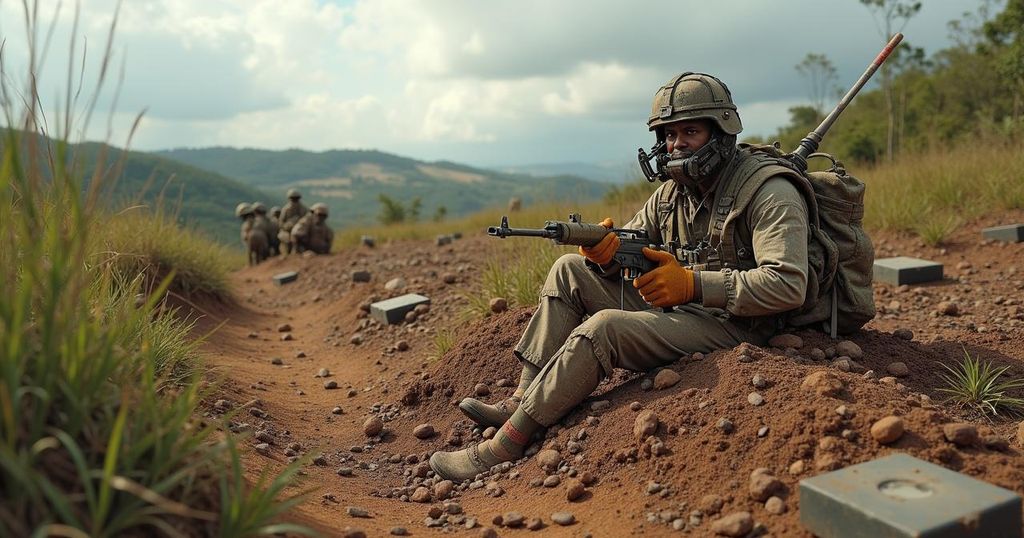The Lingering Legacy of Landmines in Colombia and Angola

Colombia and Angola are severely affected by the lasting impacts of landmines due to prolonged conflicts. Both countries struggle with extensive landmine contamination that threatens human life and hampers economic development. De-mining efforts face difficulties related to funding and logistics, necessitating robust international support and cooperation to achieve landmine-free status and address broader humanitarian concerns.
In Colombia, the reverberations of landmine explosions have permeated the fabric of society, deeply engrained in the collective consciousness of its people. Despite Bogotá’s distance from historical conflict zones, the specter of landmines persists, a bitter reminder of the nation’s more than 60-year internal conflict, primarily with groups such as the Revolutionary Armed Forces of Colombia (FARC). The rural landscapes have been particularly devastated, with countless landmines buried in villages, farmlands, and woodlands during decades of hostilities. Many of these mines were indiscriminately planted, lacking comprehensive mapping, transforming large areas into treacherous terrains. Although the Colombian government alongside international organizations has made strides in de-mining operations, the legacy of war continues to inflict loss of limbs and lives on the populace. International accords such as the Ottawa Treaty, which prohibits the deployment of anti-personnel landmines, highlight the global effort to combat this issue. Nevertheless, both Colombia and Angola remain mired in the grave consequences of landmine contamination. Angola is particularly affected, standing as one of the world’s most heavily mined nations, with over 73 million square meters of hazardous land and in excess of 1,100 known and probable minefields. Both nations struggle to advance their de-mining initiatives, impeded by insufficient funding and the enormity of the task at hand. The ramifications of landmines extend beyond immediate threats to human safety; they also stifle economic development. In Angola, remnants of its struggle for independence from Portugal and ensuing civil conflict continue to disrupt livelihoods and agricultural operations. Likewise, Colombia’s landmine presence has curtailed rural progress, obstructing families from returning to their origins or cultivating their fields without apprehension. The de-mining process itself is protracted and costly, heavily reliant on international humanitarian aid. A significant reduction in international funding for demining efforts in Angola—from over 80% between 2005 and 2017—exacerbates the inherent financing hurdles stemming from declining prices of its crucial export commodities. Initially, Angola’s government aimed to eradicate mines by December 2013 under the Ottawa Treaty; however, this deadline has been extended to 2028, underscoring the magnitude of the challenge. Colombia similarly grapples with its own objectives for landmine clearance, necessitating sustained global engagement to realize these aspirations. The failure of arms control measures to avert humanitarian crises underscores an urgent call for stricter regulations and enhanced international collaboration. Without bolstered oversight of arms trading by the global community, the ongoing repercussions of such weaponry will continue to devastate lives across generations.
The legacy of landmines remains one of the significant humanitarian challenges faced by countries like Colombia and Angola. Colombia has been embroiled in an internal conflict exceeding six decades, primarily driven by various guerrilla factions, most notably FARC. Areas of conflict have been severely affected by landmine contamination, leading to longstanding repercussions. Conversely, Angola still grapples with the effects of landmines left from its fight for independence and subsequent civil war, rendering it one of the most mined nations globally. The challenges of de-mining both nations reflect the broader implications of warfare on societal development and stability.
The persistence of landmines in Colombia and Angola presents profound humanitarian and developmental challenges. Despite ongoing de-mining initiatives, both countries continue to face significant obstacles, including funding shortages and the sheer scale of contamination that hinders progress. The plight of these nations underscores the necessity for continued international support and cooperation to eradicate the remnants of past conflicts, as well as the importance of stricter arms control regulations to prevent similar tragedies in the future.
Original Source: punchng.com






